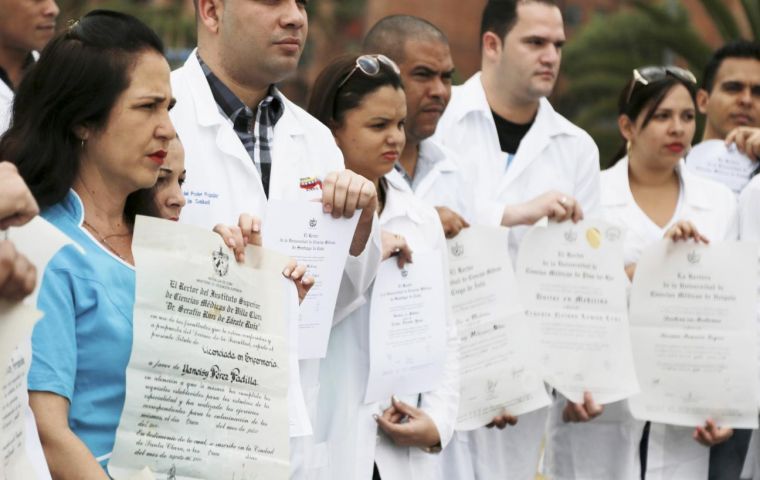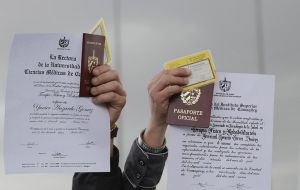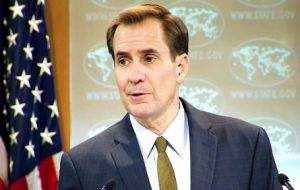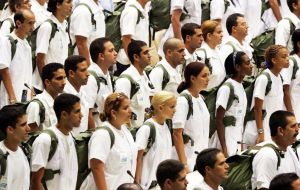MercoPress. South Atlantic News Agency
Over 700 Cuban doctors working in Venezuela have fled across to Colombia
 Brandishing their diplomas, the Cuban health professionals congregated in a plaza in Kennedy, a working-class neighborhood built in the 1960s
Brandishing their diplomas, the Cuban health professionals congregated in a plaza in Kennedy, a working-class neighborhood built in the 1960s  Authorities said that 117 Cuban doctors are currently in Colombia processing visa requests with the United States. A total of 720 have arrived this year so far
Authorities said that 117 Cuban doctors are currently in Colombia processing visa requests with the United States. A total of 720 have arrived this year so far  State Department spokesman John Kirby said that while Cubans regularly voice their concerns, “there are no plans to eliminate the visa program”.
State Department spokesman John Kirby said that while Cubans regularly voice their concerns, “there are no plans to eliminate the visa program”.  An estimated 10,000 Cuban doctors work in Venezuela, which sends Cuba some 92,000 barrels of oil a day worth about US$3.2 billion a year in exchange.
An estimated 10,000 Cuban doctors work in Venezuela, which sends Cuba some 92,000 barrels of oil a day worth about US$3.2 billion a year in exchange. Deteriorating conditions in Venezuela are causing increasing numbers of Cuban medical personnel working there to immigrate to the United States under a special US program launched in 2006 that expedites their applications.
For geographical reasons, neighboring Colombia is a favored gateway for Cubans fleeing Venezuela, who’s a populist government, is struggling to rein-in runaway inflation, widespread shortages of goods and services and rising social unrest.
On Saturday, the exodus reached critical mass when about 100 Cuban doctors, who deserted a medical mission in Venezuela and have been stranded in Colombia for months awaiting entry into the US, staged a protest to draw attention to their plight.
Brandishing their diplomas, the Cuban health professionals congregated in a plaza in Kennedy, a working-class neighborhood built in the 1960s with funds from John F. Kennedy’s Alliance for Progress.
Several described how punishing working conditions and widespread shortages of food and basic necessities, compounded by meager pay and mistreatment in Venezuela is leading many to sneak across the border seeking a new start in the United States.
While they say conditions in Colombia are better than Venezuela, the cost of living is higher, and many say they have had to borrow money from strangers and have been surviving on a single meal a day.
Apparently health care professionals say they fear the delays in processing their visa requests under the 2006 program could be a sign that President Barack Obama is seeking to end the incentive as part of his campaign to normalize relations with the communist island.
The 2006 US program was designed to lure Cuba’s medical talent and deprive President Raul Castro’s family government of an important source of foreign revenue.
Cuba has not made public how much it pays doctors on foreign missions, though it is believed to be a small fraction of what it collects from the nations where they serve.
Cuba, which prides itself on a comprehensive healthcare system and has long exported doctors and nurses to friendly states, currently has more than 50,000 healthcare professionals in some 66 nations as part of the international outreach program dating back to the 1960s.
The majority, thought to number about 10,000 persons, work in Venezuela, which sends Cuba some 92,000 barrels of oil a day worth about US$3.2 billion a year in exchange.
In Colombia, authorities said that 117 Cuban doctors are currently in the country processing visa requests with the United States. A total of 720 have arrived this year so far, although 603 have been deported because they exceeded the 90-day safe-conduct granted by Colombia in order to solicit a US visa.
State Department spokesman John Kirby said last week that while Cubans regularly voice their concerns about the program, it’s not part of bilateral talks taking place between the two governments and there are no plans to eliminate it.
“It is not at all related to our new policy with respect to Cuba,” he said. “There’s no tie, no connection”.




Top Comments
Disclaimer & comment rules-

-

-

Read all commentsI wonder why these doctors would want to flee the socialist paradise of Venezuela?
Aug 25th, 2015 - 06:55 pm 0I wonder why they don't want to return to the communist paradise of Cuba?
Answers on a postcard to....
First they may have to cross through the State of Tachira, which Maduro has just decreed Martial Law.
Aug 25th, 2015 - 07:25 pm 0The 50,000 Cuban troops in Venezuela haven't made a run for it then?
Aug 25th, 2015 - 07:39 pm 0Commenting for this story is now closed.
If you have a Facebook account, become a fan and comment on our Facebook Page!